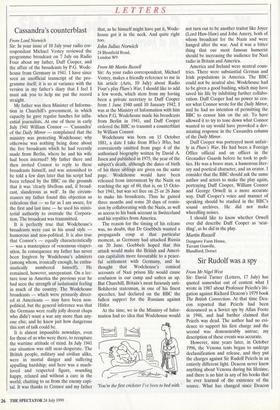Cassandra's counterblast
From Lord Norwich Sir: In your issue of 10 July your radio cor- respondent Michael Vestey reviewed the programme broadcast on 7 July on Radio Four about my father, Duff Cooper, and the affair of the broadcasts by P.G. Wode- house from Germany in 1941. I have since seen an unofficial transcript of the pro- gramme itself; it is so at variance with the version in my father's diary that I feel I must ask you to help me put the record straight.
My father was then Minister of Informa- tion in Churchill's government, in which capacity he gave regular lunches for influ- ential journalists. At one of these in early July 1941 William Connor — 'Cassandra' of the Daily Mirror — complained that the ministry was protecting Wodehouse; why otherwise was nothing being done about the five broadcasts which he had recently made from Berlin, where he and his wife had been interned? My father there and then invited Connor to reply to these broadcasts himself, and was astonished to be told a few days later that his script had been refused by the BBC on the grounds that it was 'clearly libellous and, if broad- cast, slanderous as well'. In the circum- stances my father found this objection so ridiculous that — so far as I am aware, for the first and last time — he used his minis- terial authority to overrule the Corpora- tion. The broadcast was transmitted.
It is perfectly true that Wodehouse's broadcasts were cast in his usual style humorous and non-political. It is also true that Connor's — equally characteristically — was a masterpiece of venomous vituper- ation. In consequence my father has never been forgiven by Wodehouse's admirers (among whom, ironically enough, he enthu- siastically numbered himself). He remained, however, unrepentant. On a lec- ture tour in America the previous year he had seen the strength of isolationist feeling in much of the country. The Wodehouse broadcasts — which were primarily direct- ed at Americans — may have been non- political, but the general inference was that the Germans were really jolly decent chaps who didn't want a war any more than any- one else; and he knew just, how dangerous this sort of talk could be.
It is almost impossible nowadays, even for those of us who were there, to recapture the wartime attitude of mind. In July 1941 our situation was still near-desperate. The British people, military and civilian alike, were in mortal danger and suffering appalling hardship; and here was a much- loved and respected figure, sounding happy, relaxed and without a care in the world, chatting to us from the enemy capi- tal. It was thanks to Connor and my father that, as he himself might have put it, Wode- house got it in the neck. And quite right too.
John Julius Norwich
24 Blomfield Road, London W9


























































 Previous page
Previous page